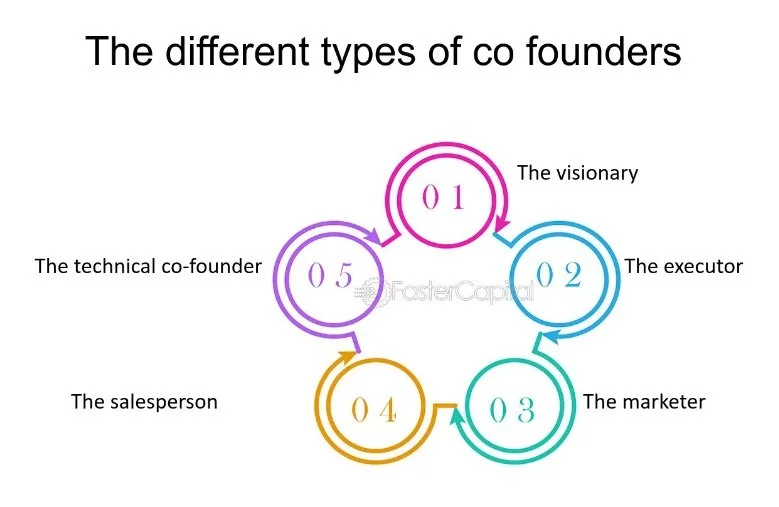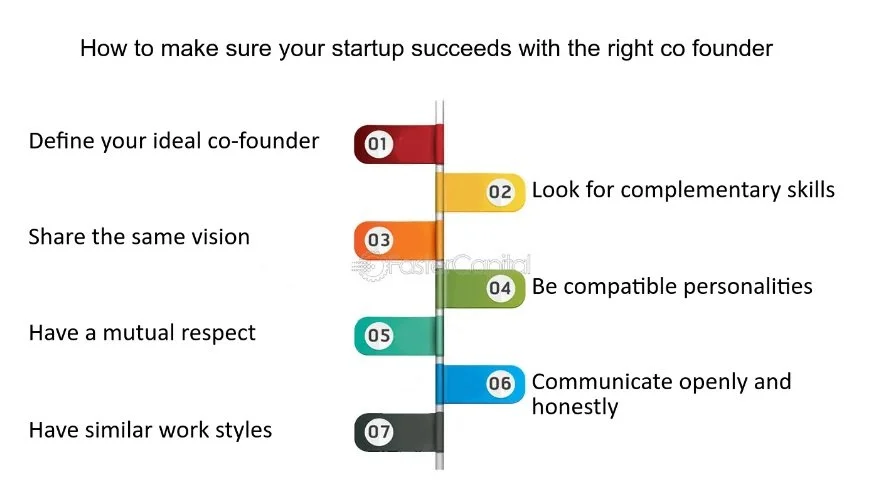14 Tips on How to Choose the Right Co-Founder for Your Startup
In the exhilarating world of startups, finding the right co-founder can make all the difference between success and stagnation. A co-founder is more than just a business partner; they are the cornerstone of your entrepreneurial journey, offering complementary skills, shared vision, and unwavering support.
However, the quest for the perfect co-founder is not merely about finding someone with impressive credentials or a stellar track record. It's about forging a deep connection with an individual whose strengths complement your weaknesses, whose values align with your own, and whose commitment matches your unwavering passion for turning dreams into reality.
In this dynamic landscape, where innovation thrives on collaboration and resilience, choosing the right co-founder isn't just a strategic decision—it's a foundational step towards building a thriving startup poised for long-term success.
Source: 123financials
Here's a detailed guide on how to go about it:
1. Define Your Startup's Vision & Values:
Before seeking a co-founder, clarify your startup's mission, goals, and values. Ensure that potential candidates align with these principles, as shared vision fosters commitment and harmony.
2. Assess Your Own Strengths & Weaknesses:
Identify your skills, expertise, and areas where you need support. Look for a co-founder whose strengths complement yours, creating a well-rounded team.
3. Look for Complementary Skills:
Seek a co-founder with skills and experience that fill gaps in your own. For instance, if you're a technical expert, consider a co-founder with strong business development or marketing acumen.
4. Evaluate Compatibility & Chemistry:
Building a startup is akin to a long-term relationship. Evaluate potential co-founders not just on their skills, but also on compatibility, communication style, work ethic, and willingness to collaborate.
5. Assess Commitment & Passion:
Ensure that your co-founder shares your level of commitment and passion for the startup. Look for someone who is dedicated, willing to invest time and effort, and resilient in the face of challenges.
6. Consider Past Experiences & Track Record:
Assess a potential co-founder's track record in startups or relevant industries. Look for individuals with a history of success, resilience in overcoming failures, and valuable lessons learned.
7. Seek Shared Values & Ethics:
Align on fundamental values and ethical standards. A shared ethical compass is vital for navigating tough decisions and building a trustworthy company culture.
Source: FasterCapital
8. Test Compatibility Through Projects:
Before formalizing a partnership, consider collaborating on a smaller project or task to gauge compatibility and effectiveness as a team.
9. Conduct Background & Reference Checks:
Verify credentials, past experiences, and reputation through background checks and references. Ensure there are no red flags that could potentially derail your startup in the future.
10. Agree on Roles, Responsibilities, & Equity:
Clearly define roles, responsibilities, and equity distribution upfront to avoid misunderstandings and conflicts later on. Establishing a fair and transparent framework is crucial for a healthy partnership.
11. Discuss Exit Strategies & Contingency Plans:
Have open discussions about exit strategies, including potential scenarios such as disagreements, personal circumstances, or changes in vision. Develop contingency plans to mitigate risks and ensure continuity.
12. Seek Legal Counsel:
Consult with legal experts to draft a comprehensive co-founder agreement that covers ownership rights, decision-making processes, vesting schedules, dispute resolution mechanisms, and other critical aspects.
13. Maintain Ongoing Communication & Feedback:
Foster open communication and provide regular feedback to nurture a strong and collaborative relationship with your co-founder. Address any issues or concerns promptly to prevent them from escalating.
14. Stay Flexible & Adapt:
Recognize that circumstances may change over time, and be willing to adapt your roles, responsibilities, and strategies accordingly. Flexibility and adaptability are key to navigating the uncertainties of startup life.
Source: FasterCapital
Choosing the right co-founder is a pivotal decision that can significantly impact the trajectory of your startup. By carefully evaluating compatibility, skills, commitment, and shared values, you can find a co-founder who not only complements your strengths but also shares your vision and passion for success.
Invest time and effort in building a strong partnership based on trust, communication, and mutual respect, laying a solid foundation for your startup's journey ahead.




